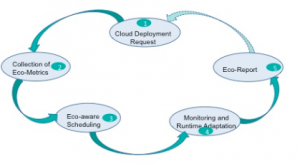Are you interested in knowing more about ECO2Clouds? here are some key figures
ECO2Clouds was envisioned to create a novel approach to make cloud computing act “greener” and become more eco-friendly by being able to assess and reduce the environmental impact of applications running on federated cloud computing environments. We built our idea as an experiment using a real multi-cloud platform called Bonfire, which provides infrastructures for experimenters on cloud facilities. However, its concepts and architectural framework can be extended to other platforms.
A general introduction to ECO2Clouds can be found in the following White paper.
An analysis and presentation of results on Good practices for Cloud Computing Energy Consumption and CO2 Emissions Optimisations are in the final project white paper.
The main results are the following:
![]() ecometrics:
ecometrics:
a set of ecometrics have been tested on three clouds, monitoring directly energy consumption and the environmental impact, using real time energy mix data. The ecometrics provide evaluations at site, host, virtual machine, and application level. Interested in knowing all details? here is a link to a deliverable that the consortium decided to make public for dissemination of ideas (link)
![]() environmental-impact aware scheduler:
environmental-impact aware scheduler:
a proof of concept scheduler to schedule virtual machines on the clouds in the federation taking into account potential environmental impact has been demonstrated in the project. For details you can read a description paper (paper)
![]() application controller:
application controller:
control on how to use virtual machines taking into account real time environmental impact data allows a further reduction of the impact considering context during execution and reconfiguring applications on the fly. Deployment strategies can also impact the environmental impact of applications (first results are described in paper1 and paper2)
An overview of the main results is in the page http://eco2clouds.eu/mission/eco2clouds-final-results/
How can you adopt ECO2Clouds in your cloud or federated cloud? Here are some general guidelines
Interested in knowing more? here are our contacts


